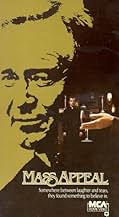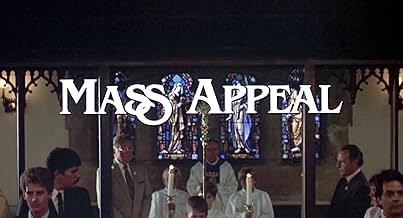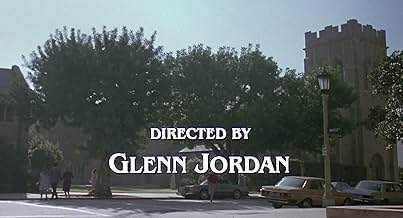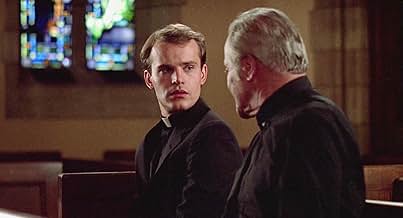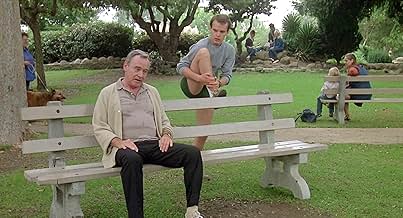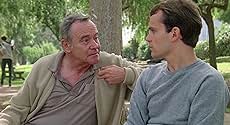NOTE IMDb
6,7/10
1,2 k
MA NOTE
Ajouter une intrigue dans votre langueA popular Connecticut priest shields a seminary rebel from the wrath of a stern monsignor.A popular Connecticut priest shields a seminary rebel from the wrath of a stern monsignor.A popular Connecticut priest shields a seminary rebel from the wrath of a stern monsignor.
- Réalisation
- Scénario
- Casting principal
- Récompenses
- 1 victoire au total
Avis à la une
Mark Dolson (Zeljko Ivanek) wants to be a priest because, as a child, someone boiled his goldfish. The alternate version is as uninspired - because he does not find fulfillment in intimate relationships with either sex, he is qualified for the priesthood. At any rate, he says that he wants `to help people.' A bit of a loose cannon, Dolson is sent by the Monsignor to serve as deacon for the now jaded Father Farley (Jack Lemmon).
What ever his faults may be, Dolson is impassioned. He wants to make a difference. The problem is that it is unclear as to whether the priesthood is the place for him to do it. As a vehicle for exploring the question of gays (or women for that matter) in the Roman Catholic priesthood, Mass Appeal is lacking because of this lack of clarity.
His lack of a clear `call' is foregrounded by his lackluster attempts at sermons. All Mark knows is that he wants to move people. He is uncertain about where his congregation is, or where he wants to move them. Farley steps in to suggest that he go for beloved. Hence the play on words in the title. Farley wants Mark to gain Mass Appeal by making the Mass appealing: if someone finds God in the process, hey that's ok too. Dolson will have none of this and founders.
Farley's appeal is that he knows the system. One gets the impression that he wants someone to rock the boat. Of course the irony of the situation is that in order to shake up the system, one must first join it.
Does this film have a meaning or a message? Well yeah, it does. But that is something for each viewer to figure out for him or herself. It won't make you hate or love the church (any church this one just happens to be Roman Catholic). Did I like the film? Yes. Is it my favorite? No not even close. It is a study of idiosyncrasies and harmless little lies (`I didn't know there was such a thing,' says Dolan). Jack Lemmon is in it for goodness sake, what else could you want?
What ever his faults may be, Dolson is impassioned. He wants to make a difference. The problem is that it is unclear as to whether the priesthood is the place for him to do it. As a vehicle for exploring the question of gays (or women for that matter) in the Roman Catholic priesthood, Mass Appeal is lacking because of this lack of clarity.
His lack of a clear `call' is foregrounded by his lackluster attempts at sermons. All Mark knows is that he wants to move people. He is uncertain about where his congregation is, or where he wants to move them. Farley steps in to suggest that he go for beloved. Hence the play on words in the title. Farley wants Mark to gain Mass Appeal by making the Mass appealing: if someone finds God in the process, hey that's ok too. Dolson will have none of this and founders.
Farley's appeal is that he knows the system. One gets the impression that he wants someone to rock the boat. Of course the irony of the situation is that in order to shake up the system, one must first join it.
Does this film have a meaning or a message? Well yeah, it does. But that is something for each viewer to figure out for him or herself. It won't make you hate or love the church (any church this one just happens to be Roman Catholic). Did I like the film? Yes. Is it my favorite? No not even close. It is a study of idiosyncrasies and harmless little lies (`I didn't know there was such a thing,' says Dolan). Jack Lemmon is in it for goodness sake, what else could you want?
Given all the revelations of sex abuse in the Catholic Church, Mass Appeal in its
own way is as dated as Going My Way in its picture of the Catholic Church and its
inner workings. Still the relationship of Jack Lemmon and Zeljko Ivanek isn't
exactly Bing Crosby and Barry Fitzgerald.
Playwright Bill C. Davis was hired to expand for the screen his two person play which 212 performances on Broadway in the 1981-82 season. It would hardly do to fill 100+ minutes of screen time with two priests just talking. Still the main focus is on popular parish priest Jack Lemmon and Zeljko Ivanek who is quite the oddball rebel at the seminary.
The monsignor in charge of the seminary Charles Durning wants Lemmon to take this kid in hand and explain the facts of life to him otherwise his ambition to be a priest will never be fulfilled. But as these two go back and forth one starts to wonder who is changing who.
On stage it worked to have the forces of repression as Ivanek sees them just be in the abstract. But for the screen Durning's role is critical in that the audience has to have the forces of oppression be personalized. Otherwise it would not have worked.
What the issues are I won't reveal, but as I said the sex abuse scandals have really dated Mass Appeal. Still it's a fine film with great performances from Lemmon, Ivanek, and Durning.
Playwright Bill C. Davis was hired to expand for the screen his two person play which 212 performances on Broadway in the 1981-82 season. It would hardly do to fill 100+ minutes of screen time with two priests just talking. Still the main focus is on popular parish priest Jack Lemmon and Zeljko Ivanek who is quite the oddball rebel at the seminary.
The monsignor in charge of the seminary Charles Durning wants Lemmon to take this kid in hand and explain the facts of life to him otherwise his ambition to be a priest will never be fulfilled. But as these two go back and forth one starts to wonder who is changing who.
On stage it worked to have the forces of repression as Ivanek sees them just be in the abstract. But for the screen Durning's role is critical in that the audience has to have the forces of oppression be personalized. Otherwise it would not have worked.
What the issues are I won't reveal, but as I said the sex abuse scandals have really dated Mass Appeal. Still it's a fine film with great performances from Lemmon, Ivanek, and Durning.
The Catholic Church is as much, if not more, political than it is spiritual. As a young Catholic boy considering the priesthood yet conflicted between my own feelings and myself and that which the Church demanded, in the end I decided to go to high school instead of entering the Seminary.
I saw this movie as a young lay man. There was such a resonance for me as a Catholic and as a young man struggling with the Church, sexuality, and spirituality.
The pastor (Lemmon) was very much the pastor of a parish that was part of my experience. As much as he was devoted to his calling, he was also responsible for the political games that are played in everyone's life. The young seminarian (Ivenek) was honest, open and young with new ideas; everything the Church wanted to suppress.
The pastor wanted nothing more than to continue his comfortable position in his parish. He was assigned a new priest-to-be who had shown himself to be a bit of a radical at the seminary. It's not to be ignored the "office politics" that were in place in the assignment.
The elder was being punished and tested, so to speak, with the assignment of this younger priest. He did his best to impose his wisdom on the younger; but the younger sought spirituality more than acceptance of the status quo. In other words, he ruffled parishioners' feathers.
When complaints were lodged about this young radical priest, his sexuality came into question. What those "powers that be" were concerned about was this young priest's sermons and indictments of false spirituality dressed up as devotion. After all, if the Church had ever really been concerned with sexuality, there'd not have been a molestation of any alter boy.
This film shows how the Church picks and chooses who to persecute. Persecution of the parish priest for not playing the political games, persecution of the young seminarian who desires to spread the Word of God.
It also indicts us as parishioners. Do we go to church to be told what we want to hear or are we there to hear God's truth? Should our contributions to the collection plate influence what we hear; or should the Word of God actually mean something? This is a memorable movie in that it makes us think about what brings us to Church.
I saw this movie as a young lay man. There was such a resonance for me as a Catholic and as a young man struggling with the Church, sexuality, and spirituality.
The pastor (Lemmon) was very much the pastor of a parish that was part of my experience. As much as he was devoted to his calling, he was also responsible for the political games that are played in everyone's life. The young seminarian (Ivenek) was honest, open and young with new ideas; everything the Church wanted to suppress.
The pastor wanted nothing more than to continue his comfortable position in his parish. He was assigned a new priest-to-be who had shown himself to be a bit of a radical at the seminary. It's not to be ignored the "office politics" that were in place in the assignment.
The elder was being punished and tested, so to speak, with the assignment of this younger priest. He did his best to impose his wisdom on the younger; but the younger sought spirituality more than acceptance of the status quo. In other words, he ruffled parishioners' feathers.
When complaints were lodged about this young radical priest, his sexuality came into question. What those "powers that be" were concerned about was this young priest's sermons and indictments of false spirituality dressed up as devotion. After all, if the Church had ever really been concerned with sexuality, there'd not have been a molestation of any alter boy.
This film shows how the Church picks and chooses who to persecute. Persecution of the parish priest for not playing the political games, persecution of the young seminarian who desires to spread the Word of God.
It also indicts us as parishioners. Do we go to church to be told what we want to hear or are we there to hear God's truth? Should our contributions to the collection plate influence what we hear; or should the Word of God actually mean something? This is a memorable movie in that it makes us think about what brings us to Church.
Pity the poor congregation of St. Francis Parish, subject to "dialogue sermons" (what???), autobiographical psycho-babble and in the end, self-righteous calls to rise up against the local Church hierarchy. If things are really like this in the Catholic Church today, its enough to make this lapsed Catholic stay that way for a long time. That said, and hoping that this does not mirror reality, the movie works as entertainment, largely due to the performances of the two main characters. Jack Lemmon is delightful and convincing as a lonely priest who has found strategies (some decent ones, some hurtful) to survive who takes on the task of mentoring and tempering the well-meaning but naive passions of a young seminarian, also well played. The big casualty is in the one-dimensionality of the "heavy" played by Charles Durning, and perhaps of all of his cronies as well. Well, Catholic bashing is nothing new, mostly by ex-Catholics, but it always diminishes the dialogue such issues could provoke. However, there is more to the movie than this, especially in some very good characterizations of Catholic lay people, Louise Latham's housekeeper in particular.
Father Farley drinks a little. He also goes to the races, is bad with first names, and tells "little lies" to get him out of tricky situations, like those involving domestic quarrels and slideshows with Monsignor Burke. But his parish loves him. Then he is assigned to look after a passionate young deacon who challenges him to step out of his blissful rut.
Jack Lemmon gives a very lived-in, often moving performance as Father Farley, and the best moments of "Mass Appeal" give us a chance to see Lemmon in his seriocomic element. But the film as a whole feels less smooth. Though it raises questions about saying what one believes versus being popular, "Mass Appeal" struggles to find a balance of its own, whether it wants to be a Neil Simon-style light comedy or a searing examination of the Catholic Church today.
Still, "Mass Appeal" is more good than not. It deals knowingly with the concepts of Catholicism, and hones in on the charms and pitfalls of the parochial life with small-bore detail. "Did I tell you about the coughs?" Father Farley tells the deacon, Mark Dolson (Zeljko Ivanek), cluing him in on one of the telltale signs a sermon-giver is losing his congregation. When giving a sermon, never say "you," always say "we." Less confrontational that way.
The problem is that Dolson is all about confrontation. He already has Monsignor Burke (Charles Durning) fuming about being called a "homophobic autocrat" for kicking out a pair of seminarians suspected of sleeping together. Dolson speaks in favor of the ordination of women, tells Farley he'd be a better priest if he drank less, and calls out the congregation during one sermon for their mink hats and blue hair.
Farley squirms from his seat behind the altar while his acolyte implodes in the pulpit, ignoring his hacking throng. "We'll be going out the back today," he mutters to an altar boy in a classic Lemmon aside.
My main problem with "Mass Appeal," as noted by other posters, was that I was never sold on Dolson's reason for becoming a priest. He seems more like a mouthpiece for Bill C. Davis, adapting his Broadway play, to vocalize his concerns about the church's position on wedge issues like celibate gays in the clergy. Ivanek plays him as a character who acts more from anger than conviction, which seems a wrong choice. You don't have to be an autocratic homophobe to think this guy, celibate or not, will have problems with his priestly office somewhere down the road.
There's a frostiness to Ivanek's scenes with Lemmon that's off-putting, and the sentiment squeezed out of them sometimes feels stagey and forced. Director Glenn Jordan worked mostly in TV movies, and while he frames his scenes well and builds a good pace, there's often a pedestrian quality to the overall presentation. You can't stick in a car chase with a film like this, but there are too many talking-head shots.
The best parts of the movie are Lemmon's scenes with Monsignor Burke, which Durning invests with his typical mix of menace and affability. Not just a heavy, Durning plays him as a bit lost. Burke really likes Farley but alienates him at the same time with his bullying, as subservience is the only kind of devotion this sacerdotal relic understands. When Dolson calls him out on his harshness, Burke targets him for his frankness and justifies his vendetta as churchly devotion.
One wishes Davis made Burke more than the bad guy, perhaps found a way to make him a more active player in the spiritual journeys of Farley and Dolson, journeys left largely unexplored here. Instead he's made the object of anger for the other characters, and even has a wormy henchman on call. Didn't Burke have his days as a lost seminarian, too?
"Mass Appeal" gets by with its light charm, its probing and atypical focus on the Catholic faith in practice, and most especially Lemmon's strong central performance. Even if you don't like Lemmon in every film of his you see, it's safe to say you will like him here. Sometimes it takes a lesser film to display a great actor, and that's what you get here.
Jack Lemmon gives a very lived-in, often moving performance as Father Farley, and the best moments of "Mass Appeal" give us a chance to see Lemmon in his seriocomic element. But the film as a whole feels less smooth. Though it raises questions about saying what one believes versus being popular, "Mass Appeal" struggles to find a balance of its own, whether it wants to be a Neil Simon-style light comedy or a searing examination of the Catholic Church today.
Still, "Mass Appeal" is more good than not. It deals knowingly with the concepts of Catholicism, and hones in on the charms and pitfalls of the parochial life with small-bore detail. "Did I tell you about the coughs?" Father Farley tells the deacon, Mark Dolson (Zeljko Ivanek), cluing him in on one of the telltale signs a sermon-giver is losing his congregation. When giving a sermon, never say "you," always say "we." Less confrontational that way.
The problem is that Dolson is all about confrontation. He already has Monsignor Burke (Charles Durning) fuming about being called a "homophobic autocrat" for kicking out a pair of seminarians suspected of sleeping together. Dolson speaks in favor of the ordination of women, tells Farley he'd be a better priest if he drank less, and calls out the congregation during one sermon for their mink hats and blue hair.
Farley squirms from his seat behind the altar while his acolyte implodes in the pulpit, ignoring his hacking throng. "We'll be going out the back today," he mutters to an altar boy in a classic Lemmon aside.
My main problem with "Mass Appeal," as noted by other posters, was that I was never sold on Dolson's reason for becoming a priest. He seems more like a mouthpiece for Bill C. Davis, adapting his Broadway play, to vocalize his concerns about the church's position on wedge issues like celibate gays in the clergy. Ivanek plays him as a character who acts more from anger than conviction, which seems a wrong choice. You don't have to be an autocratic homophobe to think this guy, celibate or not, will have problems with his priestly office somewhere down the road.
There's a frostiness to Ivanek's scenes with Lemmon that's off-putting, and the sentiment squeezed out of them sometimes feels stagey and forced. Director Glenn Jordan worked mostly in TV movies, and while he frames his scenes well and builds a good pace, there's often a pedestrian quality to the overall presentation. You can't stick in a car chase with a film like this, but there are too many talking-head shots.
The best parts of the movie are Lemmon's scenes with Monsignor Burke, which Durning invests with his typical mix of menace and affability. Not just a heavy, Durning plays him as a bit lost. Burke really likes Farley but alienates him at the same time with his bullying, as subservience is the only kind of devotion this sacerdotal relic understands. When Dolson calls him out on his harshness, Burke targets him for his frankness and justifies his vendetta as churchly devotion.
One wishes Davis made Burke more than the bad guy, perhaps found a way to make him a more active player in the spiritual journeys of Farley and Dolson, journeys left largely unexplored here. Instead he's made the object of anger for the other characters, and even has a wormy henchman on call. Didn't Burke have his days as a lost seminarian, too?
"Mass Appeal" gets by with its light charm, its probing and atypical focus on the Catholic faith in practice, and most especially Lemmon's strong central performance. Even if you don't like Lemmon in every film of his you see, it's safe to say you will like him here. Sometimes it takes a lesser film to display a great actor, and that's what you get here.
Le saviez-vous
- AnecdotesAccording to actor Zeljko Ivanek, the fish sermon scene was shot 15 times from three different angles. Although Ivanek considers the last take the best, most of it didn't make the final cut because it was too emotionally jarring for the audience.
- Citations
Father Tim Farley: You're a lunatic! And Christ NEEDS lunatics. But the trouble with lunatics is, they don't know how to survive.
- Crédits fousThis picture is dedicated to the memory of Ray A. Kroc.
- ConnexionsFeatured in At the Movies: Dune/Starman/Mass Appeal/Runaway (1984)
Meilleurs choix
Connectez-vous pour évaluer et suivre la liste de favoris afin de recevoir des recommandations personnalisées
- How long is Mass Appeal?Alimenté par Alexa
Détails
- Date de sortie
- Pays d’origine
- Langue
- Aussi connu sous le nom de
- Mass Appeal
- Lieux de tournage
- Claremont, Californie, États-Unis(myself, as I was an extra in this film)
- Sociétés de production
- Voir plus de crédits d'entreprise sur IMDbPro
Box-office
- Budget
- 7 000 000 $US (estimé)
- Montant brut aux États-Unis et au Canada
- 1 945 658 $US
- Montant brut mondial
- 1 945 658 $US
Contribuer à cette page
Suggérer une modification ou ajouter du contenu manquant


